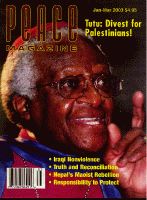
Peace Magazine Jan-Mar 2003, page 5. Some rights reserved.
Search for other articles by various here
The Bush administration has seized the Cuban Missile Crisis of forty years ago as historical support for its doctrine of "preemptive defence" and its ambitions to attack Iraq. It's a serious error for three reasons.
First, the goal of the Kennedy administration in October 1962 was disarmament-the withdrawal of missiles from Cuba-not regime change, as it is today. The appropriate analogy for Bush's initiative to remove Saddam Hussein is the 1961 Bay of Pigs invasion, a CIA-sponsored operation which failed abysmally to dislodge Cuban leader Fidel Castro from power.
Second, the Cuban Missile Crisis was resolved by negotiations, not aggression. A deal was struck that allowed the Soviet Union to wisely withdraw its missiles. Now, as then, it is essential to pursue dialogue and inspections, through the UN, instead of sponsoring an attack that would split the world.
Third, it was not US unilateralism, but the resort to the United Nations that saved the day in the Cuban Missile Crisis. The UN role, little known or appreciated in Washington today, was key to the management and resolution of the 1962 crisis. Because this contribution is largely ignored in history books and has some important parallels for today it is worth elaborating upon the UN contribution.
As Soviet ships approached the US "quarantine zone" established around Cuba, UN Secretary-General U Thant sent identical cables to US President John Kennedy and Soviet Chairman Nikita Khrushchev. He requested from Khrushchev a suspension of weapons shipments and from Kennedy a suspension of the quarantine, in order to avoid a clash at sea that could easily have escalated to nuclear war.
Fortunately, Khrushchev agreed to the Secretary-General's request. This was the first conciliatory message from the Soviet leader and a major reversal of his previously implacable position against the American quarantine. Khrushchev ordered his ships to reverse course. U Thant gained agreement from both leaders to avoid confrontation at sea. The world breathed a sigh of relief. In today's crisis, the US needs to give UN Secretary-General Kofi Annan enough room to manoeuvre to proceed towards disarmament.
Kennedy temporarily lifted the US quarantine as a measure of support during U Thant's visit to Havana in late October 1962. These initiatives bought time to find a solution to the world-threatening confrontation. In today's crisis, we have to give the UN inspectors a chance to do their work in Iraq.
In 1962, both superpowers sent high-level negotiators to the United Nations. The meetings, initially meditated by U Thant, served as an important forum to work out the details of a rough settlement. Though the UN negotiations did not lead to a formal and public treaty, they did lead to a private understanding between the parties and an agreed arrangement for the withdrawal of missiles from Cuba and the verification thereof.
U Thant's own proposals for a final settlement were significant. He was the first to officially and publicly propose the "non-invasion deal", which formed the basis for the solution of the crisis. The notion of linking withdrawal of Soviet missiles to American assurances against an invasion of Cuba was made by U Thant in the UN Security Council on October 24 (UN Day). Because U Thant had made the proposal it was easier for the parties to accept it, rather than look like they were backing down in the face of the armed might. In today's conflict, both sides should listen carefully to the proposals of the current UN Secretary-General on means to implement a settlement.
Unfortunately, US history books do not do justice to the UN role in resolving the Cuban missile crisis. But just after the crisis, President Kennedy said: "U Thant has put the world deeply into his debt." As we seek to learn from the Cuban Missile Crisis, we should recognize and remember that debt, and give thanks for the United Nations and Secretary-General U Thant. And, if common sense prevails in the current standoff, we may find ourselves giving similar praise to the current Secretary-General, Kofi Annan, for his initiatives to resolve another major crisis forty years later.
Walter Dorn

Peace Magazine Jan-Mar 2003, page 5. Some rights reserved.
Search for other articles by various here